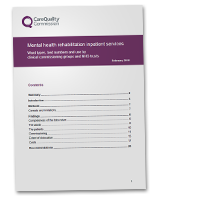This briefing looks at mental health rehabilitation inpatient services, including ward types, bed numbers and use by clinical commissioning groups and NHS trusts.

Mental health rehabilitation inpatient services are an essential element of our mental health care system, but we are concerned about the high number of beds situated a long way from the patient’s home.
This could result in people becoming isolated from their friends and families and cut off from the local services that will provide care following discharge.
To find out more, we asked providers about the mental health rehabilitation inpatient services that they manage. We did this work in collaboration with NHS England and NHS Improvement.
This report presents our findings.
What we did
We sent a request for information to all 54 NHS and 87 independent healthcare providers that manage mental health rehabilitation inpatient services.
The information request asked about:
- the number of locations and wards providing mental health rehabilitation services and the average daily cost of a bed on those wards
- the type, size and ‘locked’ status of the wards
- each patient’s length of stay, funding authority and the mental healthcare provider that would be responsible for aftercare
We excluded wards that provided longer-stay treatment and care for people with learning disability or for older people (most of whom had dementia) and units that specialised in the care of people with acquired brain injury.
What we found
- Nearly two thirds (63%) of placements in residential-based mental health rehabilitation services are ‘out of area’, which means they are in different regions to the clinical commissioning groups (CCGs) that arranged them
- There is very wide variation between CCG areas in the use of rehabilitation beds, and in the use of beds that are out of area
- This is a costly element of provision. We estimate that the annual expenditure on mental health rehabilitation beds is about £535 million. Out of area placements account for about two-thirds of this expenditure
Our recommendations
In response to these findings, we recommend that the Department of Health and Social Care, NHS England and NHS Improvement agree a plan to engage local health and care systems in a programme of work to reduce the number of patients placed in mental health rehabilitation wards that are out of area.